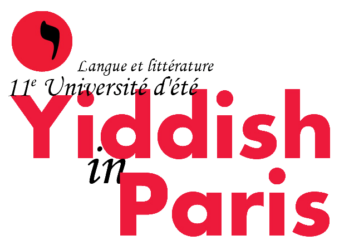Celebrating the 100th anniversary of YIVO: July 18-21
The second weekend of our summer university will be dedicated to the 100th anniversary of the YIVO, the central institute for research in the Yiddish field (founded in Vilnius, and since 1945 in New York). We will be welcoming three professors from the United States for a series of talks and lectures.
- David E. Fishman is a professor of Jewish History at The Jewish Theological Seminary, teaching courses in modern Jewish history. Conference: YIVO During World War II. Interview: My memories of New York YIVO in the 1970s.
- Paul Glasser is the former Dean of the Max Weinreich Center at the YIVO in New York. Conference: ” The YIVO Philology Department in Vilnius”. Interview: “My work as a yiddish philologist”
- Elissa Bemporad is a professor of History at CUNY, center for Jewish Studies, NY. She is a specialist on Jewish history in Eastern Europe. Conference: “YIVO through Soviet Jewish Eyes”.
Conference: YIVO During World War II – David Fishman
By 1939, YIVO had firmly established itself as the central scholarly institution of Polish Jewry, and of Yiddish-speaking Jews worldwide. During the war, YIVO shared the tragic and heroic fate of the communities it represented. We will see this by following the story of YIVO’s leaders, staff, collections, physical facility, and publications during the years 1939-1945. It is indicative that two of the institute’s three heads in Vilna perished during the war: Zalmen Reijzin at the hands of the Soviets, and Zelig Kalmanowicz at the hands of the Nazis. Only Max Weinreich was fortunate enough to emigrate to the United States in 1940 and rebuild YIVO on American soil. YIVO’s story is one of murder and survival, looting and rescue, destruction and rebuilding. YIVO became the only Jewish institution in the world that was itself, as an institution, a refugee Holocaust survivor.
YIVO Through Soviet Jewish Eyes – Elissa Bemporad
This talk examines the relationship between YIVO and the Yiddish scholarly institutions that were established in the Soviet Union after the Bolshevik Revolution, in particular in Minsk, Kharkiv, and Moscow. If during the second half of the 1920s, the relationship between YIVO and Soviet Jewish cultural and scholarly institutions endured, with some attempts at cosponsoring academic endeavours, after 1930 these relations subsided, giving rise to heightened political diatribes. This talk will also explore the attack launched against YIVO and its scholarship by the 1930 publication Fascist Yiddishism.
Lectures about Yiddish culture and History
Shprekherins, Zogerins, Klogerins and Feldmesterins: women spirit workers in Jewish Eastern Europe – Annabel Cohen
In stereotypical portrayals of Jewish life in Eastern Europe, religion and spirituality are often presented as a man’s domain, located in patriarchal institutions like the shul, shtibl and beys-midresh. Yet certain aspects of religious life- such as tending to deceased ancestor spirits or warding off the evil eye- were, in Yiddish writer Itsik Manger’s words, seen predominantly as “women’s business.” This talk will present some of the professional women’s roles which, appearing frequently in Yiddish literature, played an important part in the traditional religious world of Jewish Eastern Europe. Highlighting the cemetery as an important site of ritual and prayer, the talk will pay particular attention to Ashkenazi “cemetery women” and to their Yiddish tkhines (prayers) and klogenishn (laments).
Far ayer frayhayt un far undzere – Jews, Yiddish and the International Brigades – Annabel Cohen
Between 1936 and 1938, around 35,000 volunteers travelled to Spain to fight against Franco, Hitler and Mussolini in the Communist-led International Brigades, organized in Paris by the French Communist Party’s immigrant umbrella organization, the Main D’Oeuvre Immigrée (MOI). It is estimated that around 10 percent of the volunteers in this multi-national “people’s army” were of Jewish origin, many of them Yiddish speakers or the children of Ashkenazi immigrants. Focusing on how they combined anti-fascist resistance with Yiddish cultural activities both before, during, and after the Spanish Civil War, this talk will discuss the role played in the International Brigades by a network of Jewish Communist organizers in Barcelona, Paris and New York.

